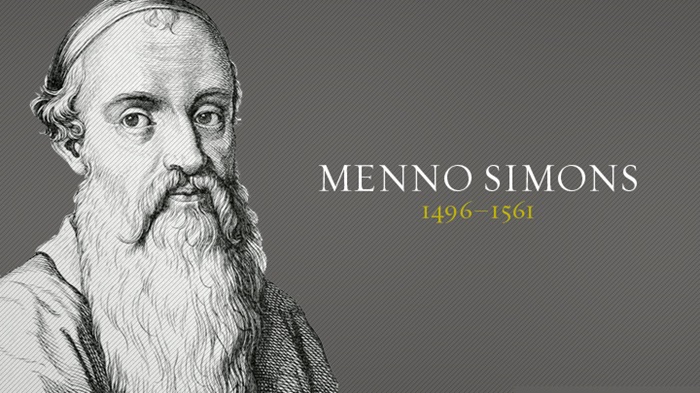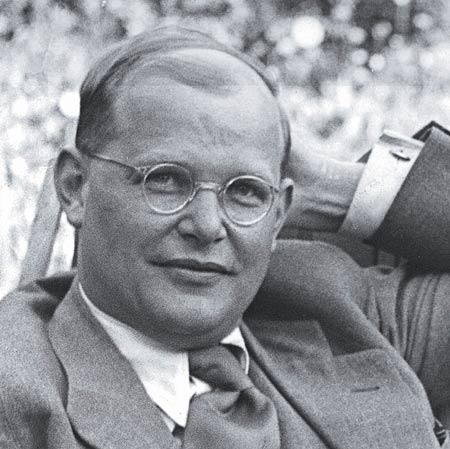I recently finished The Complete Works of Menno Simons and thought it might be interesting to list some of the ways Menno Simons might raise some eyebrows..
If you can think of any I missed, I would welcome a comment.
Menno Told State Officials How They Should Live & Govern
As you read the Complete Writings of Menno Simons you will likely be struck at how often he addresses magistrates. Menno sounds like John the Baptist challenging Herod’s moral indiscretions or the Jewish prophets calling Israel’s kings on the carpet as he calls state officials to justice, a life of sobriety, care for the poor and the fear of God. One example:
…fear the Lord, your God, with all your powers; judge in all wisdom with fear and trembling; help the oppressed; grieve not the distressed; promote the just cause of the widows and orphans; protect the good; punish the evil in a christian manner [1]; discharge the duties of your offices properly; seek the kingdom and country that will endure forever; and reflect that you, however highly esteemed, upon earth are only pilgrims and sojourners in a strange land. [Location 2790]
or
…Yes, beloved lords, Can you thus convert yourselves with all your hearts? Can you change your hearts and humble yourselves before God? Deny yourselves, seek and follow Christ and his righteousness? Renounce the world and flesh with all its lusts, as you have heard? [Location 4199]
Menno’s caveat below, “as far as Scripture permits”, is likely alluding to the fact that the Scripture does not permit the Christian to take part in capital punishment, based on other comments he makes:
Do not excuse yourselves, beloved sirs, and judges, that you are the servants of the emperor; this will not acquit you in the day of vengeance. It availed Pilate nothing that he crucified Christ in the name of the emperor. Serve the emperor in imperial matters, so far as Scripture permits, and serve God in divine matters, then you may claim his grace and call yourselves after his name. [Location 2735]
Menno Was Opposed to Capital Punishment
Answering Micron who painted Menno as a Christian anarchist:
I said nothing more to you than that it would hardly become a true, christian ruler to shed blood, for this reason: If the transgressor should truly repent before his God, … and for such an one to be hanged on the gallows…or in any manner be harmed by another christian, …would look somewhat strange and unbecoming, according to the…example of Christ, the meek Lamb, which example he has commanded all his chosen children to follow. Again, If he remain impenitent, and his life be taken, one would do nothing else but unmercifully rob him of the time of repentance… [Location 20156]
Next Menno says he approves of the example of the pagan Lacedaemonians, who did not practice capital punishment:
Profane history shows that the Lacedæmonians, who were gentiles, did not practice capital punishment; but they imprisoned them and put them at labor. [Location 20178]
Did Menno Abstain from All Wine? Perhaps No
Menno notes:
“Some…say…that I…drink more wine than they do beer.” [Location 315]
And his response is not that he does not drink, but that
My Lord and Master, Jesus Christ, was also called a winebibber, and a glutton. I trust that through the grace of the Lord, I am innocent in this matter, and stand acquitted before God. [Location 315]
Does this mean he drank? It should be noted that Menno gives many and long exhortations against drunkenness. As GAMEO points out, he gave “many admonitions to a sober life with warnings against drunkenness”.
Menno Was Encouraged by Reading Martin Luther
Not too often that you’ll hear a Mennonite quote Martin Luther as a source of encouragement, but Menno Simon in fact does:
I was encouraged by Luther in the belief, that human authority cannot bind to eternal death… [Location 196]
But, to be sure, Menno also deeply disagreed with Luther on many points.
Menno Was Familiar with Pagan History & the Philosophers
Menno could throw in a quote from Socrates or about Plato without blinking eye.
But all those who are not instructed in this wisdom from God, though they were as glorious as Solomon, as victorious as Alexander, as rich as Croesus, as strong as Hercules, as learned as Plato, as subtle as Aristotle, as eloquent as Demosthenes and Cicero, and as well skilled in languages as Mithridates… [Location 3294]
And a little Socrates:
Yea, dear reader, I freely admit, as did Socrates, that I only know one thing, as regards human skill and wisdom, and that is, that I know nothing. [Location 12778]
And Aristotle & Plato as examples of approving generosity:
But, as to the alms and support of the poor, I would say, that it is a good and praise-worthy work, and cordially approve of it. Also, that many pious, gentile philosophers, as Aristotle, Plato, etc., have considered it as right and just. [Location 9208]
Menno Quotes the Apocrypha & Its Characters Alongside the Bible Without a Pause
Peter and Susanna in one breath…
We think with holy Peter, that we should rather obey God than man; and with virtuous Susanna, it is better to fall into the hands of man, than into the hands of God. [Location 2096]
Daniel and “the fair virtuous Susanna…”
…the three faithful young men in the fiery furnace, the beloved Daniel, and the fair, virtuous Susanna, the honorable pattern of all pious women, Daniel 13. They would rather endure for a season the wrath and fury of tyrants, than sin, and thus bring upon themselves the eternal anger and wrath of God. [Location 3551]
Menno Repeatedly Requested to Have Debates with Magisterial Reformers
Menno apparently did not subscribe to merely being “the quiet in the land” as he repeatedly requested the opportunity to debate. (as did Humaier and other early Anabaptists) One example:
I voluntarily make this offer: If they allow me a discourse with them under safe conduct, either privately before witnesses, or publicly, before a full assembly, and if I cannot prove or maintain, by the power of the truth that the preachers, in general, are deceivers and not pastors, and that their pompous, avaricious, extortionate swearing and cursing disciples… [Location 10578]
Menno Was Familiar With the Theologians & Theologies of His Day
Menno read & was familiar with the theologians of his day. In between duties, writing, running and hiding, apparently he read the theologians of his day: Luther, Bucer, & Bullinger [Location 188] and critiqued their theology: Infant baptism, focus on grace to the exclusion of obedience, their views on the sword and more. Once example:
Martin Luther says, The word is that which God speaks in himself, and which remains in him and is never separated from him. We do not controvert the testimony of Erasmus and of Luther; but we cited them for the reason that it might be observed what diversity of opinion exists. [Location 12825]
Menno Uses Imagery from the Book of Revelation to Describe Events of History
Menno uses Revelation as a description of the past:
…it is annotated in the Lutheran New Testament, that this Origen is the great star which fell from heaven, burning like a lamp, and that his name is Wormwood, Rev. 8:11.
Or the present, his debate partners Micron & Herman:
Justly has the Holy Spirit likened this generation unto the fearful apocalyptic locusts whose shapes were like unto horses prepared unto battle, who have crowns on their heads, like gold; which however are not gold; of which Micron and Herman have placed one on each others head, by their writings; their teeth are as the teeth of lions, and they have tails like unto scorpions, and there are stings in their tails, Rev. 9. [Location 19044]
And, of course, the future.
Menno Was Vitally Interested in the Question: What Is Faith?
In fact he wrote a book on the subject of “The True Christian Faith Which Converts, Changes, Makes Pious…” in 1556. [Location 3258] “True Evangelical Faith” was not just a one time quote, but a subject that Menno was very interested in and a theme he often brought up. This may be one of the missed theological contributions of Menno Simons.
…for a true, sincere, Christian faith cannot be idle; but it changes, renews, purifies, sanctifies and justifies more and more; it makes joyous and glad, for by faith it knows that hell, devil, sin and death, are conquered through Christ [Location 4915]
We do not agree with dead faith or meritorious work:
we testify before you and before all the world that we do not agree with those who teach and institute a dead faith..Secondly, that we can be saved by our own merits and works,… [Location 15975]
And the quintessential Menno Simons (which incidentally is not in his book on “The True Christian Faith” mentioned above, but in “The Reasons Menno Simon Does Not Cease Teaching & Writing”):
For true evangelical faith is of such a nature that it cannot lay dormant; but manifests itself in all righteousness and works of love; it dies unto flesh and blood; destroys all forbidden lusts and desires; cordially seeks, serves and fears God; clothes the naked; feeds the hungry; consoles the afflicted; shelters the miserable; aids and consoles all the oppressed; returns good for evil; serves those that injure it; prays for those that persecute it; teaches, admonishes and reproves with the Word of the Lord; seeks that which is lost; binds up that which is wounded; heals that which is diseased and saves that which is sound. The persecution, suffering and anxiety which befalls it for the sake of the truth of the Lord, is to it a glorious joy and consolation.[Location 15503]
Interestingly Menno Simon’s description of true evangelical faith above errs neither on the side of a mere social gospel (which some shortened versions of the above quote seem to imply) nor the “faith as belief” gospel of some others.
Menno Far Too Often Used 100 Words When 5 Would Have Been Just Fine
Menno is quite wordy and often far too wordy. In Menno’s writing on the “Incarnation of Christ” the publishers graciously note:
…the publishers have taken the liberty to condense and abridge some
parts thereof and also, here and there, to leave out such parts as they
considered of no importance in the illustration and explanation of the
subject, and which were not edifying to the reader. [Location 21457]
Menno Sported a Mustache with His Beard
The source for this is every drawing of Menno Simons there is, including the one on the front of your copy of “The Complete Writings of Menno Simons” edited by J. C. Wenger and published by Herald Press. (below) This is a very ill kept secret, but there it is.

In conclusion I would note that you can get The Complete Works of Menno Simons Kindle Edition for only $1.99 on Amazon. (this is Menno’s writings as published by the Funks, not the J C Wenger edition).
Let’s be inspired by those who’s voices faithfully call to the way of Jesus, and humbled by the march of time which continues to change the context into which we are called to do so today.
This article was reprinted on the Mennonite World Review on Oct 19, 2016. If you want to follow the discussion generated there here is the link.








